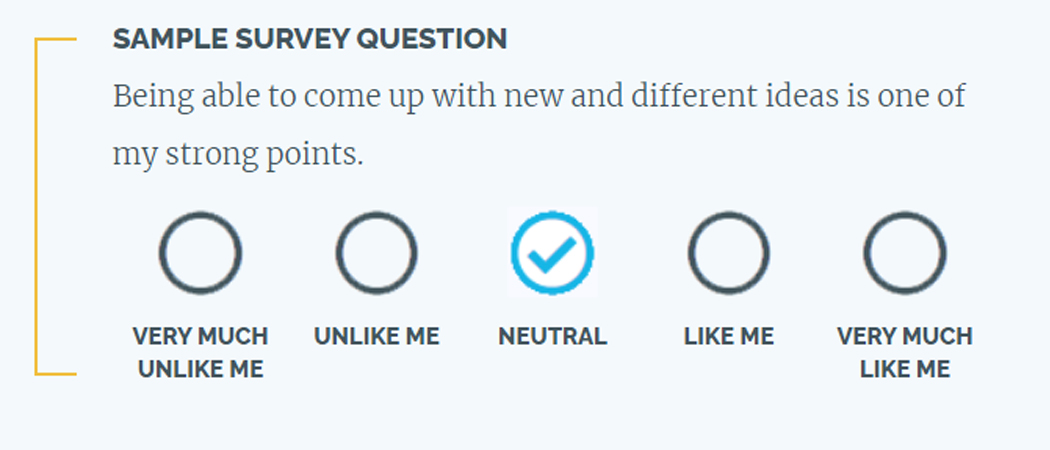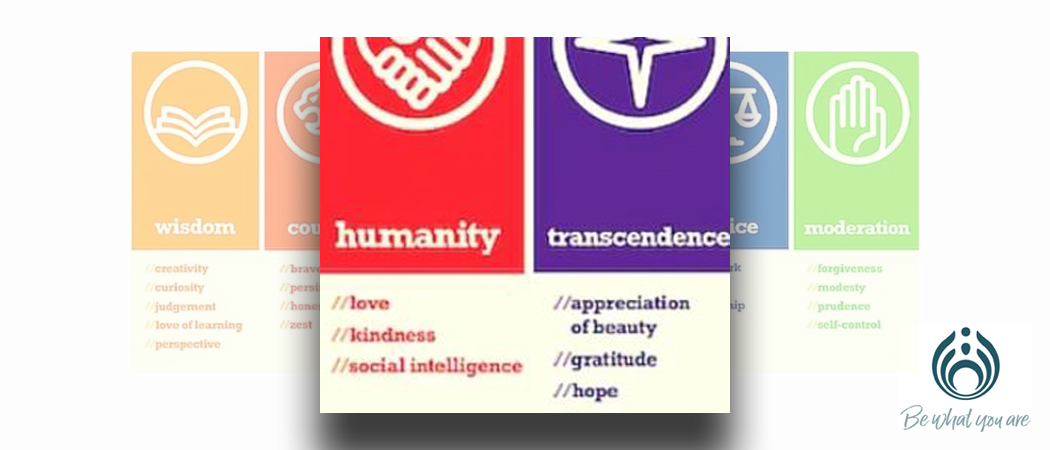We are all truly one of a kind
Relevant literature, considering philosophies of human virtues, reveals a surprising amount of similarity across cultures and strongly indicates a historical and cross-cultural convergence of six core virtues: Courage, Justice, Humanity, Temperance, Transcendence, and Wisdom. The number of potential character strengths profiles, which are catagorised into the 6 virtues, is exponentially greater than the number of people living on our planet.
Specific character strengths have been directly associated with these 6 Virtues, which can be accurately identified by undertaking the VIA Character Strengths Survey www.viacharacter.org/survey/account/register, the only FREE, scientific strengths measure.

Another piece to the puzzle
Enabled with the benefits of this information, positive psychology practitioners like us are able to count on practical applications to help individuals and organizations identify their strengths and use these strengths to enhance their mental fitness to skillfully improve and maintain their levels of well-being.
In keeping with the broad premise of positive psychology, strengths allow the individual to achieve more than the absence of distress and disorder. They “break through the zero point” of psychology’s traditional concern with disease, disorder, and failure to address quality of life. (Peterson, 2000)
Can we hold hope that positive psychology, which is causally linked to a person’s unique character strengths, and a skillful command of this knowledge will be able to help people evolve toward their highest potential?
From our experience…YES!
This does rely on evidence-based, practical strategies that when employed ensure that people flourish personally and professionally? The VIA Character Strengths Survey, which is central to our Strengths Circuit program, is directly linked to the fundamentals of Positive Psychology, which makes it a perfect place to start.
OK, let’s take a look at the virtues…and their associated character strengths ?
Wisdom & Knowledge
The trait of Wisdom and Knowledge include positive traits related to the acquisition and use of information in the service of the good life. The associated personal strengths:
Creativity – a creative person must produce ideas or behaviors that are recognizably original—novel, surprising, or unusual. However, originality per se does not define creativity. The relevant behaviors or ideas must also be adaptive. The individual’s originality must make a positive contribution to that person’s life or to the life of others.
Curiosity – curious people pursue experiential novelty, variety, and challenge. As an intrinsically motivated trait, curiosity is fulfilling. Finding out an answer, having a new experience, learning a new fact—all satisfy the curious individual.
Open-Mindedness – the open-minded person works at this style of thinking. He or she is not indecisive, wishy-washy, nihilistic, or permissive. Neither does the open-minded thinker bring this style to bear on all matters.
Love of Learning – people who possess the general trait of love of learning are positively motivated to acquire new skills or knowledge or to build on existing skills and knowledge. Love of learning is inherently fulfilling—that is why it is called love. The person high in this character strength experiences positive feelings when acquiring new skills and knowledge, even when frustrations intrude.
Perspective – the ability to take stock of life in large terms, in ways that make sense to oneself and others. Perspective is the product of knowledge and experience, but it is more than the
accumulation of information. It is the coordination of this information and its deliberate use to improve well-being.
Courage
Strengths of courage entail the exercise of will to accomplish goals in the face of opposition, either external or internal. Bravery in the face of imminent death is not the equivalent of fearlessness because fear is certainly experienced. Rather, bravery is the ability to do what needs to be done despite fear.
Bravery – people possess the disposition to voluntarily act, perhaps fearfully, in a dangerous circumstance, where the relevant risks are reasonably appraised. In an effort to obtain or preserve some perceived good for oneself or others recognize,ng that the desired perceived good may not be realized. The courageous exercise a will to accomplish goals in the face of opposition, either external or internal.
Persistence – while perseverance does not guarantee success, success is often unattainable without it. Persistent people withstand setbacks and voluntarily continue with goal-directed actions in spite of obstacles, difficulties, or discouragement. People who persevere generally expect that their persistence will be rewarded with the outcome they seek.
Integrity – people with integrity are true to themselves, and accurately represent—privately and publicly—their internal states, intentions, and commitments. They accept and take responsibility for their feelings and behaviours, owning them, as it were, and reaping substantial benefits by so doing. Individuals with the character strength of integrity would strongly endorse such statements as these:
- It is more important to be myself than to be popular.
- When people keep telling the truth, things work out.
- I would never lie just to get something I wanted from someone.
Vitality – someone whose aliveness and spirit are expressed not only in personal productivity and activity—such individuals often infectiously energize those with whom they come into contact. Vitality describes a dynamic aspect of well-being marked by the subjective experience of energy and aliveness (R. M. Ryan & Frederick, 1997). Individuals with a high level of vitality would strongly endorse such statements as these:
- I feel alive and vital.
- I have energy and spirit.
- I nearly always feel awake and alert.
Humanity
Strengths of humanity include positive traits manifest in caring relationships with others, what S. E. Taylor et al. (2000) referred to as dispositions to tend and befriend. The entries in this virtue class resemble those we identify as Justice strengths. The difference is strengths of humanity are brought to bear in one-to-one relationships, whereas those of justice are most relevant in relationships of one-to-many.
Love – Love represents a cognitive, behavioural, and emotional stance toward others that takes three prototypical forms. One is love for the individuals who are our primary sources of affection, protection, and care. Another form is love for the individuals who depend on us to make them feel safe and cared for. The third form is love that involves passionate desire for sexual, physical, and emotional closeness with an individual of mutual feelings.
Kindness – actions that give rise to helping behaviours that are not based on an assurance of reciprocity, reputational gain, or any other benefits to self. However, such benefits may emerge and need not be resisted. Individuals with this strength would strongly endorse statements such as:
- Others are just as important as me.
- Having a warm and generous affect seems to bring reassurance and joy to others.
- Giving is more important than receiving.
Social intelligence – exhibiting special capacities realted to experiencing and strategising about emotion. An adeptness at perceiving emotions in relationships, and people who are socially intelligent display a keen understanding of their emotional relationships with others, as well as of the meanings of emotions in those relationships.
Justice
We regard strengths of justice as broadly interpersonal, relevant to the optimal interaction between the individual and the group or the community. As the group shrinks in size and becomes more personalized, the strengths of justice begin to converge with the one-on-one strengths of humanity discussed in the previous section.
Citizenship – social responsibility, loyalty, and teamwork represent a feeling of identification with and sense of obligation to a common good that includes the self but that stretches beyond one’s own self-interest. A generative spirit and sense of responsibility for the community are further indicators of this strength. Individuals with this strength would be likely to be active in the civic affairs of their communities — by voting, joining voluntary associations, or contributing time and money to social or environmental causes.
Fairness – the product of moral judgment—the process by which people determine what is morally right, what is morally wrong, and what is morally proscribed. Individuals who have developed the psychological strengths associated with fairness would strongly endorse such statements as:
- Everyone should get her fair share.
- It’s wrong to use people.
- I wouldn’t want to cheat anyone, any more than I would want to be cheated.
Leadership – Individuals with this predisposition aspire to dominant roles in relationships and social situations. They comfortably manage their own activities and the activities of others in an integrated system. Individuals with this strength are likely to strongly endorse such statements about themselves as:
- I prefer to take on the leadership role in a group.
- I am often able to plan a course of action for my group.
- I am often able to motivate and help others do a task better.
Temperance
Temperance strengths are defined in part by what a person refrains from doing, and they may be more apparent to observers in their intemperate absence than in their temperate presence. It is worth emphasizing that the strengths of temperance temper our activities rather than bringing them to a complete halt. We may be highly forgiving, but we can still defend ourselves while being pummelled.
Hatred— against which forgiveness and mercy protect us; arrogance—against which humility and modesty protect us; short-term pleasure with long-term costs— against which prudence protects us. Destabilising emotional extremes of all sorts—against which self-regulation protects us.
Forgiveness and Mercy – Forgiveness represents a suite of prosocial changes that occur within an individual who has been offended or damaged by a relationship partner. When people forgive, their basic motivations or action tendencies regarding the transgressor become more positive (e.g., benevolent, kind, generous) and less negative (e.g., vengeful, avoidant). Individuals with a strong disposition to forgive would endorse statements such as the following:
- When someone hurts my feelings, I manage to get over it fairly quickly.
- I don’t hold a grudge for very long
Humility and Modesty – Humility involves a non-defensive willingness to see the self accurately, including both strengths and limitations. Humble individuals will not wilfully distort information in order to defend, repair, or verify their own image. For humble people, there should be no press toward self-importance and no burning need to see—or present—themselves as being better than they are. Individuals with a strong disposition to forgive would endorse statements such as the following:
- an accurate (not underestimated) sense of one’s abilities and achievements
- the ability to acknowledge one’s mistakes, imperfections, gaps in knowledge, and limitations (often with reference to a “higher power”)
- openness to new ideas, contradictory information, and advice
Prudence – Prudent individuals show a farsighted and deliberative concern for the consequences of their actions and decisions, successfully resist impulses and other choices that satisfy shorter term goals at the expense of longer-term ones. They have a flexible and moderate approach to life, and strive for balance among their goals and ends. Individuals with this strength have the following attributes:
- They take a foresighted stance toward their personal future, thinking and caring about it, planning for it, and holding long-term goals and aspirations.
- They are skilled at resisting self-defeating impulses and at persisting in beneficial activities that lack immediate appeal.
Self-regulation – refers to how a person exerts control over his or her own responses so as to pursue goals and live up to standards. These responses include thoughts, emotions, impulses, performances, and other behaviours. The standards include ideals, moral injunctions, norms, performance targets, and the expectations of other people. They may direct their thought processes in directions other than where their minds naturally wander, they may attempt to change their emotional responses away from how they initially feel, and they may restrain themselves from carrying out impulses and desires.
Transcendence
The common theme running through the strengths of transcendence is that each allows individuals to forge connections to the larger universe and thereby provide meaning to their lives. Almost all the positive traits in our classification reach outside the individual—character, after all, is social in nature—but in the case of the transcendence strengths, the reaching goes beyond other people per se to embrace part or all of the larger universe.
Appreciation of Beauty and Excellence – refers to the ability to find, recognize, and take pleasure in the existence of goodness in the physical and social worlds. A person high on this strength frequently feels awe and related emotions (including admiration, wonder, and elevation) while, for example, walking in the woods or in a city, while reading novels or newspapers, while learning about people’s lives or while watching sports or movies.
Gratitude – a sense of thankfulness and joy in response to receiving a gift, whether the gift be a tangible benefit from a specific other or a moment of peaceful bliss evoked by natural beauty. Individuals with this strength would strongly endorse such statements as the following:
- It is important to appreciate each day that you are alive, it’s much more of a gift than it is a burden..
- I often reflect on how much easier my life is because of the efforts of others.
Hope – optimism, future-mindedness, and future orientation represent a cognitive, emotional, and motivational stance toward the future. Thinking about the future, expecting that desired events and outcomes will occur, acting in ways believed to make them more likely, and feeling confident that these will ensue given appropriate efforts sustain good cheer in the here and now and galvanize goal-directed actions. Individuals with this strength would strongly endorse such statements as:
- Despite challenges, I always remain hopeful about the future.
- I always look on the bright side.
- I am confident that my way of doing things will work out for the best.
Humor – meanings: (a) the playful recognition, enjoyment, and/or creation of incongruity; (b) a composed and cheerful view on adversity that allows one to see its light side and thereby sustain a good mood; and (c) the ability to make others smile or laugh. Individuals with this strength would strongly endorse such statements as:
- Whenever my friends are in a gloomy mood, I try to tease them out of it.
- I welcome the opportunity to brighten someone else’s day with laughter.
- Most people would say I am fun to be with.
Spirituality – refers to beliefs and practices that are grounded in the conviction that there is a transcendent (nonphysical) dimension of life. These beliefs are persuasive, pervasive, and stable. They inform the kinds of attributions that people make, the meanings they construct, and the ways they conduct relationships. The following sorts of questions and statements distinguish between individuals who are spiritual or religious and those who are not:
- What is your current religious preference?
- Are you a member of a church or religious institution?
- Do you have a spiritual philosophy you practice?

Virtue spotting
Developing your vocabulary by virtue spotting is a wonderful way to start developing a deep understanding of these personal qualities in action. Identifying role-models can be a useful way of coming up with behaviours associated with specific virtues and strengths.
For example, you may consider someone like the late Steve Jobs represented the virtues of Wisdom and knowledge and Courage, whilst considering a list of actions that he took to suggest he possessed this strength. You could get into the practice of asking questions like – What would a person who has the virtue of Humanity do and say, in a specific situation?
Try this: When you next watch a movie, focus on identifying character strengths you can spot in the characters and then match this to the relevant virtue. For example,
Take the first step in leveraging your Virtues!
At Get Mentally Fit, our Programs and Services are informed by the fundamental concept of positive psychology. We also highly value identifying a client’s virtues, by identifying their character strengths, which allows us to skillfully support them to realise their prioritised positive change. Having facilities to establish and sustain a dialogue around virtues affords us the luxury of customising a client’s Program or Service outcomes.
Contact us to enquire into undertaking the pro-active step of reliably measuring, and skillfully enhancing, your current mental fitness.


